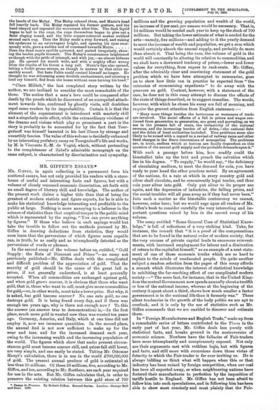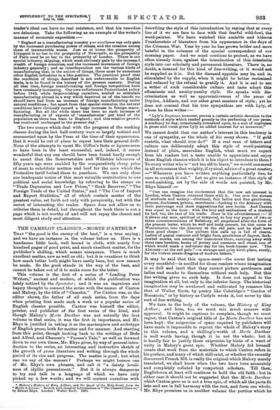MR. GIFFEN'S ESSAYS.*
MR. GOFER, in again collecting in a permanent form his scattered essays, has not only provided his readers with a store- house of useful and interesting facts and figures, but with a volume of closely reasoned economic dissertation, set forth with no small degree of literary skill and knowledge. The author of the present work claims a higher title than that of being the greatest of modern statists and figure experts, for he is able to make his statistical knowledge interesting and profitable to the public at large. Nothing is more annoying to a believer in the science of statistics than that sceptical temper in the public mind which is represented by the saying, "You can prove anything by figures." If those who believe in such sayings would but take the trouble to follow out the methods pursued by Mr. Giffen in drawing deductions from statistics, they would soon learn that the perversions of which figures seem capable can, in truth, be as easily and as triumphantly detected as the perversions of words or phrases.
In the second essay of the volume before us, entitled, "Gold Supply : the Rate of Discount and Prices "—an essay not previously published—Mr. Giffen deals with the complicated and difficult problem of the appreciation of gold. That the scarcity of gold should be the cause of the great fall in prices, if not generally understood, is at least generally accepted. When all commodities are exchanged against gold, and when gold grows scarcer, it is obvious that those who want gold, that is, those who want to sell, must give more commodities for gold,—or, in other words, must take a lower price. But why, it is asked, has gold become scarcer ? No one eats gold, no one destroys gold. It is being found every day, and if there was enough ten years ago, why is there not enough now P To this the answer (an answer true to demonstration) is,—In the first place, much more gold is wanted now than was wanted ten years ago. Germany, America, and Italy, which at one time did not employ it, now use immense quantities. In the second place, the annual find is not now sufficient to make up for the wear and tear, and for the increased demand each year, owing to the increasing wealth and the increasing population of the world. The figures which show that under present circum- stances gold must become scarcer still, and prices fall still lower, are very simple, and can easily be stated. Taking Mr. Ottomar Haupt's calculation, there is in use in the world 2700,000,000 of gold. The present annual produce of gold is estimated at less than 20 millions. Of these 20 millions, five, according to Mr. Giffen, and ten, according to Mr. Soetbeer, are each year required for use in the arts. But Mr. Giffen calculates that, in order to preserve the existing relation between this gold store of 700 • Essays in Finance. By Robert Giffen. Second Series. London : George-Bell and Sons. 1886. millions and the growing population and wealth of the world, an increase of 2 per cent, per annum would be necessary. That is, 14 millions would be needed each year to keep up the stock of 700 millions. But taking the lower estimate of what is needed for the
arts—namely, five millions—and adding to it the yearly demand to meet the increase of wealth and population, we get a slim which would certainly absorb the annual supply, and probably do more than absorb it. That 'being the case, the volume of gold in the world will constantly be altering its relation to commodities, and we shall have a downward tendency of prices,—lower and lower values for everything, from rupees to rack-rents. Mr. Giffen, after the admirably clear and convincing statement of the gold problem which we have here attempted to summarise, goes on to show how little can in practice be expected from "the extension of economising expedients" to do away with the pressure on gold. Content, however, with a statement of the case, he does not in this essay attempt to discuss the effects of the state of things described, or to suggest remedies. The words, however, with which he closes his essay are fall of meaning, and require the gravest attention from English statesmen :—
"Many more things besides the betterness or worseness of trade are involved. The social effects of a fall in prices and wages con- tinued from generation to generation, are great and pervading, as we see in the present fall of rents, the inelasticity of the national revenue, and the increasing burden of all debts,—the national debt and the debts of local authorites included. Nice problems seem also likely to be raised with a regard to a revisal of railway rates and other fixed charges in the State concessions of monopolies. The problems are, in truth, endless which at bottom are finally dependent on this question of the annual gold supply and the probable demands upon it."
With such a passage before him, how readily could the bimetallist take up the text and preach the salvation which lies in his dogma. "To supply," he would say, "the deficiency of circulating medium, to meet the demand for coin, you have ready to your hand the other precious metal. By an agreement of the nations, fix a rate at which in every country gold and silver shall circulate, and be concurrently legal tender, and thus coin your silver into gold. Only put silver to its proper use again, and the depression of industries, the falling prices, and the social troubles will all pass away as if they had never been." Into such a matter as the bimetallic controversy we cannot, however, enter here ; but we would urge upon all readers of Mr. Giffen's book to consider carefully the very interesting and im- portant questions raised by him in the second essay of his volume.
The essay entitled "Some General Uses of Statistical Know- ledge," is full of reflections of a very striking kind. Take, for instance, the remark that "it is a proof of the compensations that are to be found in the natural order of modern society, that the very success of private capital leads to enormous reinvest- ments, with increased employment for labour and a diminution of return to the capitalist himself," as an example of a neat state- ment of one of those economic truths which are so hard to explain to the minds of uneducated people. On quite another subject a random selection from the pages of this essay affords
a remark which illustrates the interest of statistical knowledge
in exhibiting the far-reaching effect of our complicated modern society :—" The mere fact, for instance, that in the United King- dom the central Government now spends annually about a twelfth or less of the national income, whereas at the beginning of the century it spent about a third, shows how much smaller a factor government is in the national life than it formerly was." These silent tendencies in the growth of the body politic we are apt to overlook, and it is only by the use of statistics such as Mr.
Giffen commands that we are enabled to discover and estimate them.
In "Foreign Manufactures and English Trade," made up from
a remarkable series of letters contributed to the Times in the early part of last year, Mr. Giffen deals less purely with statistical facts, and breaks ground in the controversies of
economic science. Nowhere have the fallacies of Fair-traders been more triumphantly and conspicuously exposed. Not only
are their arguments met with ruthless logic, but with figures and facts, and still more with excursions down those vistas of futurity to which the Fair-trader is for ever inviting us. He is always bidding us think what will happen when this or that
industry has been ruined by foreign competition, when our coal has been all exported away, or when neighbouring nations have fostered their manufactures to perfection by the imposition of tariffs hostile to England. Mr. Giffen has not been afraid to follow him into such speculations, and in following him has been able to show most concisely and most ,plainly that the Fair- trader's ideal can have no real existence, and that his remedies are delusions. Take the following as an example of the writer's manner of economic exposition :—
"England as a manufacturing country par excellence can only gain by the increased purchasing power of others, and the creation among them of innumerable wants. Jest as at home the prosperity of Liverpool is no bar to the prosperity of Newcastle, so the prosperity of Paris need be no bar to the prosperity of London. There is one special industry, shipping, which must obviously gain by the increased wealth of foreign countries, and the increased movement of foreign industry generally ; and so interdependent are the various kinds of manufacturing that, in the nature of things, there must be numerous other English industries in a like position. The practical proof that the condition of things described is not unfavourable to English trade, is to be found in the history of the present century. Daring all that time, foreign manufacturing and foreign competition have been constantly increasing. Our own unfortunate Protectionist policy before 1843, while impoverishing ourselves, tended to stimulate manufacturing abroad in a way which deprived us of the benefit we should have had from an increase of foreign manufacturing under natural conditions ; but apart from that special stimulus, the natural conditions have obviously caused a large increase in foreign manu- facturing. But all the while there has been no such increase of manufacturing or of exports of 'manufactures' per head of the population as there has been in England ; and this relative growth has continued unchanged to the present day."
The two essays which deal with the progress of the working classes during the last half-century were so largely noticed and commented upon by the Press at the time of their appearance, that it would be out of place to repeat here their general drift. None of the attempts to upset Mr. Giffen's facts or figures seem to have been in the least successful, and, indeed, it seems wonderful that any one should have been found hardy enough to assert that the Sornersetshire and Wiltshire labourers of fifty years ago were enabled by the comparatively cheap price of meat to substitute mutton and beef for the corn which the Protective tariff forbad them to purchase. We can only close our inadequate notice of this most valuable contribution to our political and social knowledge by referring to the essays on "Trade Depression and Low Prices," "Bank Reserves," "The Foreign Trade of the United States," and "The Use of Import and Export Statistics," all of which contain matter of the greatest value, set forth not only with perspicuity, but with the secret of interesting the reader. Space does not allow us to criticise them in detail, but throughout the book there is not a page which is not worthy of and will not repay the closest and most diligent study and attention.

















































 Previous page
Previous page